|
|
|
Sort Order |
|
|
|
Items / Page
|
|
|
|
|
|
|
| Srl | Item |
| 1 |
ID:
144880
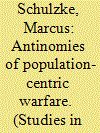

|
|
|
|
|
| Summary/Abstract |
There is tension between three of the U.S. counterinsurgency doctrine's central goals: the restoration of security, democratization, and cultural respect. These goals are particularly difficult to reconcile when it comes to the treatment of women and children in contested areas. Those groups have unique security concerns that are margin-alized in the U.S. military's conceptions of security and they may be victims of violence that is tacitly permitted by efforts to show cultural respect. After discussing these problems as they appear in U.S. counterinsurgency doctrine the author shows how they shape events in real operations with the help of interviews conducted with veterans of the wars in Afghanistan and Iraq.
|
|
|
|
|
|
|
|
|
|
|
|
|
|
|
|
| 2 |
ID:
136170
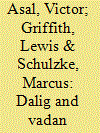

|
|
|
|
|
| Summary/Abstract |
For classes which contain a discussion of strategy, war, political violence, terrorism, insurgency, peace operations, or ethno-nationalist conflict to name a few, students must have an effective, foundational understanding of the complexities of using military force. To that end, we have developed an operational “battlefield” exercise, the Dalig–Vadan Exercise (DVE), which allows an entire class of students to get a sense of the dynamics and complexities of command and execution of competing strategies without any military background, any particular emphasis on time, place, or context, and de-emphasizing the consequences of violence. Anchored on Clausewitz's friction and fog, the DVE provides students with a first-person encounter with decision making in a dynamic, multiparty, informational-limited, and time-sensitive environment that can be related to a wide range of courses and course material in international relations and related fields.
|
|
|
|
|
|
|
|
|
|
|
|
|
|
|
|
| 3 |
ID:
114155
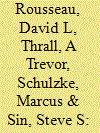

|
|
|
|
|
| Publication |
2012.
|
| Summary/Abstract |
Despite strong empirical evidence for democratic peace theory, the historical record indicates that democracies have been involved in many wars. This article conducts a critical examination of how democratic polities become entangled in international conflict. The examination focuses on how democratic leaders manage domestic politics and public opinion at each stage of the conflict (i.e. disputes, crises, wars and settlement). The study explores how democracies are drawn into conflict; when democracies provoke conflict; what claims democratic leaders make to justify conflict; when domestic audiences support or oppose conflict; and the implications for democratic leaders after conflicts. It argues that democratic leaders pursue various strategies that are shaped by the stage of the conflict, the domestic institutional structure and the level of mobilised domestic opposition.
|
|
|
|
|
|
|
|
|
|
|
|
|
|
|
|
| 4 |
ID:
168403
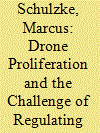

|
|
|
|
|
| Summary/Abstract |
The controversy surrounding military drones has generated many proposals for restricting or prohibiting existing drones, additional autonomous variants that may be created in the future, and the sale of drones to certain markets. Moreover, there is broad interest in regulating military drones, with proposals coming not only from academics but also from NGOs and policymakers. I argue that these proposals generally fail to consider the dual-use character of drones and that they therefore provide inadequate regulatory guidance. Drones are not confined to the military but rather spread across international and domestic security roles, humanitarian relief efforts, and dozens of civilian applications. Drones, their component technologies, the control infrastructure, and the relevant technical expertise would continue to develop under a military-focused regulatory regime as civilian technologies that have the potential to be militarized. I evaluate the prospects of drone regulation with the help of research on other dual-use technologies, while also showing what the study of drones can contribute to that literature. Drones’ ubiquity in nonmilitary roles presents special regulatory challenges beyond those associated with WMDs and missiles, which indicates that strict regulatory controls or international governance frameworks are unlikely to succeed. With this in mind, I further argue that future research should acknowledge that drone proliferation across military and civilian spheres is unavoidable and shift focus to considering how drone warfare may be moderated by countermeasures and institutional pressures.
|
|
|
|
|
|
|
|
|
|
|
|
|
|
|
|
| 5 |
ID:
162652
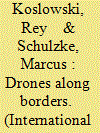

|
|
|
|
|
| Summary/Abstract |
This article examines the complex security landscape that is unfolding as states deploy military drones for border security and non-state actors with sharply diverging motives develop their own drone surveillance capacities. We argue that border security drones have contrary political, policy, and ethical implications. First, the encroachment of military technologies into non-military security operations may have adverse security repercussions, but drones may also save migrants’ lives as they make dangerous journeys through deserts and across rough seas. Second, drone surveillance erodes privacy but also creates new accountability mechanisms. Finally, drones may obviate some visible signs of security, such as fences, while also introducing an invisible security apparatus that extends beyond state boundaries. These contradictory effects help to explain the complex policy formation processes underlying drone border security programs in the United States and Europe, as well as the challenge of reaching clear answers about whether drone security is desirable.
|
|
|
|
|
|
|
|
|
|
|
|
|
|
|
|
| 6 |
ID:
111645
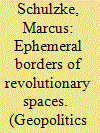

|
|
|
|
|
| Publication |
2012.
|
| Summary/Abstract |
From the Paris Commune to the Red Shirt uprising in Bangkok, revolutionaries lacking the power to overthrow their states or depose unpopular politicians have captured parts of major cities and formed their own temporary enclaves of resistance. These groups create intraurban borders by building barricades, arming themselves, and fighting to protect their space. The borders, while temporary and usually ineffective, are powerful symbols as they separate a sphere of active resistance from territory under state control. While these borders stand, they are challenges to state power - lines marking the limits of what states can control. This essay looks at how these borders arise and how they relate to more familiar types of borders. Revolutionary borders are shaped by many of the same forces as national borders, most notably globalisation, but have a distinct character that is closely linked to the changing geography of urban areas.
|
|
|
|
|
|
|
|
|
|
|
|
|
|
|
|
| 7 |
ID:
145478
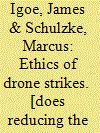

|
|
|
|
|
| Publication |
New Delhi, Alpha Editions, 2016.
|
| Description |
xiii, 48p.pbk
|
| Standard Number |
99789385505805
|
|
|
|
|
|
|
|
|
|
|
|
Copies: C:1/I:0,R:0,Q:0
Circulation
| Accession# | Call# | Current Location | Status | Policy | Location |
| 058679 | 358.4/IGO 058679 | Main | On Shelf | General | |
|
|
|
|
| 8 |
ID:
157745
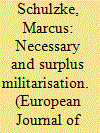

|
|
|
|
|
| Summary/Abstract |
Recent scholarship on militarisation suggests that Western democracies are threatened by military influence spreading into civilian domains. I contend that this research has identified problematic forms of militarisation, but that more careful attention should be given to different manifestations of this phenomenon. I borrow Herbert Marcuse’s distinction between necessary and surplus repression to show that militarisation can be excusable or excessive, depending on the context and its extent. Militarisation is potentially harmful and should be opposed when it is coercive or promotes militarism. By contrast, militarisation may be necessary if it is beneficial or ineliminable. A degree of militarisation may be desirable insofar as contact between civilians and soldiers promotes the spread of information, ensures that civilians have some influence on the military, and prevents members of the military from feeling detached and resentful. Some militarisation may also be indispensable for guarding against plausible threats or promoting social stability. Thus, militarisation should be treated as a process that has mixed costs and benefits depending on how it is enacted.
|
|
|
|
|
|
|
|
|
|
|
|
|
|
|
|
| 9 |
ID:
162659
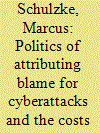

|
|
|
|
|
| Summary/Abstract |
Attribution is one of the most serious challenges associated with cyberattacks. It is often difficult to determine who launched an attack and why, which hinders efforts to formulate appropriate responses. Although the attribution problem has been discussed extensively in research on cybersecurity, it is generally approached as a technical challenge for security professionals and politicians. I contend that it is vital to take the attribution problem beyond this elite focus by considering how attributional challenges can interfere with the public’s efforts to understand security challenges and evaluate government actions. Faced with uncertainty and the confusion of attempting to understand novel cyber threats, citizens frequently lack the information they need to reliably identify the culprits behind attacks—or sometimes even to know whether an attack has taken place. I show that attributional uncertainty immediately following cyberattacks encourages dependence on a narrow range of elite frames and the assignment of blame to familiar enemies. Over time this promotes conspiratorial thinking and poses a risk to democratic accountability. When seen in light of these broader costs, the attribution problem becomes a vital political concern with implications that reach beyond the scope of elite-focused cybersecurity research.
|
|
|
|
|
|
|
|
|
|
|
|
|
|
|
|
| 10 |
ID:
155164


|
|
|
|
|
| Summary/Abstract |
This article explores the political significance of the narratives of partisan warfare that appear in American popular culture. I draw on Carl Schmitt’s concept of the ‘telluric partisan’ – a figure that fights outside the normative boundaries of conventional war in defence of a homeland and the traditional identities that are rooted in it. These fantasies provide a sense of moral clarity, promote national unity, characterise enemy aggression, and glorify traditional values. They establish a ready-made narrative that can be invoked to frame conflicts in terms of the heroic defence of an innocent and victimised people protecting themselves against foreigners and their dangerous ideologies. As I show, this call for popular engagement in war generally serves a conservative project of directing potentially revolutionary expressions of populism and vigilante justice into defence of family and the territorial status quo.
|
|
|
|
|
|
|
|
|
|
|
|
|
|
|
|
| 11 |
ID:
117729
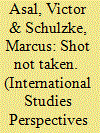

|
|
|
|
|
| Publication |
2012.
|
| Summary/Abstract |
The American military has been engaged in combat operations first conventional and then counterinsurgent for more than 8 years and the issue of political violence from a variety of different directions is an important issue to address in the college classroom. In this paper, we focus on the pedagogy of the ethics of political violence of jus in bello (the ethics of activity within war). We present an overview of three different ethical perspectives that can be applied to ethical dilemmas as they relate to political violence and then a series of scenarios that can be used to start discussions with students about the ethical dilemmas faced by both insurgents and counter insurgents and possible solutions that the ethical literature offers.
|
|
|
|
|
|
|
|
|
|
|
|
|
|
|
|
| 12 |
ID:
137145
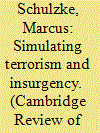

|
|
|
|
|
| Summary/Abstract |
This article analyses several video games created by Hezbollah and Afkar Media which simulate recent conflicts in Israel and Lebanon. These games are representative of an important new means of waging ideological warfare which is increasingly a part of the media strategies that states, violent non-state actors and media corporations employ in their efforts to persuade audiences. I argue that video games allow their developers to address players as though they were participants in ongoing conflicts, rather than passive observers, and that this style of presentation is extremely useful to efforts to create an attractive image of people who are frequently described as ‘terrorists’. Video games also enable their developers to carefully construct media narratives that appear to be realistic depictions of contemporary conflicts even when those narratives show signs of bias. Through these mechanisms, video games provide violent non-state actors and organizations sympathetic to them with a means of presenting their grievances and displaying their fighting prowess in ways that advance the organizations' strategic goals
|
|
|
|
|
|
|
|
|
|
|
|
|
|
|
|
| 13 |
ID:
164452


|
|
|
|
|
| Summary/Abstract |
Economic sanctions have faced substantial criticism for being blunt coercive instruments that inflict a broad array of harms upon innocent populations. In response to this, the targeted sanctions movement has sought to limit the form, function, and scope of sanctioning efforts to minimize their adverse effects on average citizens who have no direct role in influencing the objectionable policies sanctions' senders senders want changed. We seek to take stock of whether targeted sanctions are truly more ethical coercive policies. We argue that targeted sanctions strategies, as practiced by the international community, tend to make tradeoffs amongst just war theory principles and at the cost of sanctions’ utility. Rather than representing an ethical form of coercion, targeted sanctions often just differ from more comprehensive sanctions in how they violate just war principles. We demonstrate this by showing that although targeted sanctions are arguably more consistent with the principle of discrimination's prohibition of deliberately targeting civilians, they nevertheless conflict with other norms, such as proportionality and reasonable probability of success. Moreover, targeted sanctions have these adverse effects despite an appearance of precision that may make it easier to employ coercion.
|
|
|
|
|
|
|
|
|
|
|
|
|
|
|
|
| 14 |
ID:
156639
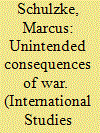

|
|
|
|
|
| Summary/Abstract |
Although extensive research has been done on the causes of violence against civilians, it is usually directed at explaining why civilians are deliberately targeted or how militaries organize themselves in ways that lead soldiers to endanger civilians. As I show, many civilians are injured or killed by members of armed forces who strive to comply with the norms of war. Some attacks on civilians during ground combat operations in contemporary wars can be explained in terms of the tension soldiers experience between their indefeasible right of self-defense and their uncertainty about the identity and location of civilians on the battlefield. I illustrate this tension and explore its consequences by drawing on interviews with American and British veterans of the wars in Afghanistan and Iraq. This helps to explain the persistence of attacks on civilians even as the American and British armed forces make greater efforts to respect noncombatant immunity.
|
|
|
|
|
|
|
|
|
|
|
|
|
|
|
|
| 15 |
ID:
150503
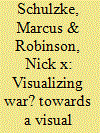

|
|
|
|
|
| Summary/Abstract |
Political scientists are increasingly engaged with the importance of the “visual turn,” asking questions about how we understand what we see and the social and political consequences of that seeing. One of the greatest challenges facing researchers is developing methods that can help us understand visual politics. Much of the literature has fallen into the familiar qualitative versus quantitative methodological binary, with a strong bias in favor of the former, and has consequently been unable to realize the advantages of mixed-methods research. We advance the study of visual politics as well as the literature on bridging the quantitative versus qualitative divide by showing that it is possible to generate quantitative data that is rooted in, and amenable to, qualitative research on visual phenomena. Our approach to conducting mixed-methods research is an alternative to the more common strategy of seeing various research methods as an assortment of tools, as it is directed at developing an organic relationship between qualitative and quantitative methods. We demonstrate the effectiveness of this strategy for research on visual politics by discussing our own efforts to create a dataset for quantifying visual signifiers of militarism.
|
|
|
|
|
|
|
|
|
|
|
|
|
|
|
|
| 16 |
ID:
145516
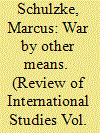

|
|
|
|
|
| Summary/Abstract |
The 2014 Israel-Gaza Conflict inspired the creation of over a dozen games for mobile phones and tablets. These games, which allowed players to Bomb Gaza City, operate the Iron Dome missile defence system, and direct rockets into Israeli settlements, marked an important shift in the mediatisation of war in three ways. First, whereas propaganda is frequently described as a top-down process by which elites influence mass audiences, the mobile war games about Gaza were created by non-elite indie game developers, thereby illustrating these games’ capacities for allowing new actors to participate in ideological contestation. Second, the games were not simply reflections on the conflict, but part of it. They were released while the fighting was in progress and helped to constitute the ideological battleground. Finally, the games reproduced established propaganda techniques in distinctive ways that were shaped by the mobile gaming medium.
|
|
|
|
|
|
|
|
|
|
|
|
|
|
|
|
| 17 |
ID:
159567
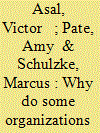

|
|
|
|
|
| Summary/Abstract |
This study addresses the question of why organizations choose to use violence as a strategy using the Political Organizations Dataset (POD) data set, which includes both violent and nonviolent organizations from the Middle East. Our findings show that religious ideology and social service provisions have less influence on this decision than the existing literature suggests. They also reveal that organizations that advocate the exclusion of women from public life, those that advocate a change in state boundaries, and those that experience state repression are more likely to use violence.
|
|
|
|
|
|
|
|
|
|
|
|
|
|
|
|
|
|
|
|
|